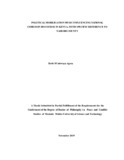Please use this identifier to cite or link to this item:
http://ir-library.mmust.ac.ke:8080/xmlui/handle/123456789/1344Full metadata record
| DC Field | Value | Language |
|---|---|---|
| dc.contributor.author | Agesa, Ruth M’mbwaya | - |
| dc.date.accessioned | 2019-12-02T09:29:53Z | - |
| dc.date.available | 2019-12-02T09:29:53Z | - |
| dc.date.issued | 2019-11 | - |
| dc.identifier.uri | http://r-library.mmust.ac.ke/123456789/1344 | - |
| dc.description.abstract | Music and society have always been intimately related. Music reflects and creates social conditions including the factors that either facilitate or embed social change. Political mobilization music influences the levels and status of national cohesion. Some music can bring about peaceful coexistence and others can cause conflict. Scholars have researched and written Music for environmental, social and cultural purposes. However, PMM which is known to trigger conflict or foster national cohesion has been neglected yet during general elections, alignments has been evident due to PMM (Abayomi 2011). The study sought to examine how political mobilization music influence national cohesion discourse in Kenya, with specific reference to Nairobi County as a general objective. The specific objectives were to examine the nature and evolution of political mobilization music in Post-colonial Kenya, assess the influence of Political Mobilization Music (PMM) on status and levels of national cohesion and examine the challenges inherent in employing political mobilization music towards national cohesion. The study was based on the conceptual framework informed by three theories; Critical Race Theory (CRT), Music Meaning Theory and a Just Peace Theory. The research adopted descriptive research design with mixed method approach, utilizing both primary and secondary data. The study population consisted of 1015 citizens, political mobilization musicians and government officials. The sample size was 156 respondents. Data for the study was collected using questionnaires, FGDs and in-depth interviews with key informants. Quantitative data was analyzed using descriptive statistics and presented in tables, pie charts, graphs while qualitative data were analyzed using qualitative methods with specific reference to SPSS, cross-tabulation and Excel presented in description. Analysis of the results showed that the nature of political mobilization music were praise, demonizing, idolizing, patriotic and solidarity songs. Evolution of PMM took place from precolonial era (1963-1982) with solidarity and patriotism, Nyayo era (1982 – 1992) with praising and idolizing songs, multiparty era (1992-2000) with praising, idolizing and demonizing songs and Millennium age (post 2000) with demonizing songs and tribal alignment music. On the status of national cohesion, it was a two-sided coin, with positive and negative peace in Nairobi County, while the levels of national cohesion were very high. Key challenges inherent in employing PMM towards national cohesion is that the National Cohesion and Integration Commission, Kenya Music Festival, Music Copyright Society of Kenya have minimum powers in regulating music songs. This attributed to lack of clear policies on punishing people with hate speech. The findings showed that the influence was on two folds both negative and positive depending on the nature of songs composed and sang. It is recommended that composition of National patriotic songs is a one special way of branding the country to the rest of the world.The findings of this study will contribute to the existing knowledge and formulation of state policies on the political mobilization music influencing national cohesion in Kenya and benefit particularly peace workers. | en_US |
| dc.description.sponsorship | MMUST | en_US |
| dc.language.iso | en | en_US |
| dc.publisher | MMUST | en_US |
| dc.subject | Music,society,Political,mobilization,cohesion,conflict, | en_US |
| dc.title | POLITICAL MOBILISATION MUSIC INFLUENCING NATIONAL COHESION DISCOURSE IN KENYA, WITH SPECIFIC REFERENCE TO NAIROBI COUNTY | en_US |
| dc.type | Thesis | en_US |
| Appears in Collections: | School of Disaster Management and Humanitarian Assistance | |
Files in This Item:
| File | Description | Size | Format | |
|---|---|---|---|---|
| Ruth M.Agesa PhD Thesis November 2019.pdf | 13.34 MB | Adobe PDF |  View/Open |
Items in DSpace are protected by copyright, with all rights reserved, unless otherwise indicated.
